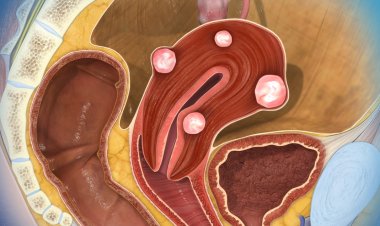New Research Indicates How Cholesterol Types Impact Heart Disease Risk
Heart disease is the leading cause of death in adults, and doctors for nearly 100 years have studied risk factors to try and mitigate their patients' risk. One of the primary factors they analyze is cholesterol — HDL, or "healthy," cholesterol to indicate protection, and LDL, or "lousy" cholesterol to indicate a higher risk. However, a recent review of previous studies shows that it's actually more complex than that. The analysis, published in April's edition of the European Heart Journal, found that cholesterol gathers together in "balls," which are unique combinations of small and large particle HDLs and LDLs. "Having lots of Small Particle LDL increases risk for heart attacks, and Large Particle LDL may not be a major risk factor," said Dr. Gabe Mirkin in a recent post. "Having lots of Large Particle HDL helps to prevent heart attacks and lots of Small Particle HDL may not help to prevent heart attacks." Mirkin, a fitness guru, longtime radio host, and sports medicine doctor with more than 50 years of practice, added that people who may be at risk for heart disease should ask their doctors for a blood test measuring for LDL and HDL cholesterol, non–HDL-cholesterol and cholesterol particle size. "Both a high (>90) and low HDL (


Heart disease is the leading cause of death in adults, and doctors for nearly 100 years have studied risk factors to try and mitigate their patients' risk. One of the primary factors they analyze is cholesterol — HDL, or "healthy," cholesterol to indicate protection, and LDL, or "lousy" cholesterol to indicate a higher risk.
However, a recent review of previous studies shows that it's actually more complex than that. The analysis, published in April's edition of the European Heart Journal, found that cholesterol gathers together in "balls," which are unique combinations of small and large particle HDLs and LDLs.
"Having lots of Small Particle LDL increases risk for heart attacks, and Large Particle LDL may not be a major risk factor," said Dr. Gabe Mirkin in a recent post. "Having lots of Large Particle HDL helps to prevent heart attacks and lots of Small Particle HDL may not help to prevent heart attacks."
Mirkin, a fitness guru, longtime radio host, and sports medicine doctor with more than 50 years of practice, added that people who may be at risk for heart disease should ask their doctors for a blood test measuring for LDL and HDL cholesterol, non–HDL-cholesterol and cholesterol particle size.
"Both a high (>90) and low HDL (<35) cholesterol are associated with increased risk," Mirkin said.
By learning your cholesterol details, you can work with your doctor to create a plan to lower your chances of getting the disease. In addition to measuring LDLs and HDLs, you can do several other things to mitigate your risk of getting heart disease.
1. Create a weight loss plan if needed.
If you have a high BMI, losing weight is one of the best things you can do to lower your risk of getting heart disease. Your weight relative to your height determines your BMI, also called body mass index. BMI is helpful because it shows whether you're underweight, at a normal weight, overweight, or obese. You can also use our Free Diet Analysis to learn your BMI and get meal plan recommendations from our team of nutritionists.
2. Enjoy healthy, wholesome foods regularly.
Consistently eating nutritious meals is vital to living longer. Your meals should contain a balanced portion of protein, whole grains, and fruits and vegetables. If you need help figuring out where to start, Diet-to-Go can help! We offer four menus crafted by chefs and designed by nutritionists. Our Mediterranean menu, particularly, provides a diet high in healthy fats, Omega-3 fatty acids, fruits, vegetables and nuts. Studies have found that a Mediterranean diet can lead to weight loss, as well as combat heart disease and stroke, and avoid Type 2 diabetes and premature death.
3) Quit nicotine.
Nicotine is the addictive substance found in cigarettes, vape devices, snuff, some gums, and more. Scientists say nicotine increases your heart rate and blood pressure and may also harden your arterial walls. Quitting nicotine is essential to heart health.
4) Exercise at least five days a week.
Whether you go out for a 20-minute walk, sign up for a fitness class, head to the gym, play a sport, or just do something light like cleaning or gardening, regular exercise can help keep your resting heart lower during the day, which, in turn, can decrease your heart disease risk.
5) Don't drink alcohol every day.
Drinking alcohol excessively can potentially increase your blood pressure and cause weight gain. While the occasional beer, glass of wine, or cocktail is fine, try not to drink every night.
Bottom Line
Knowing your specific type of cholesterol, whether HDL or LDL, and its particle size is an excellent first step to determining your heart disease risk factor. Talk to your doctor about your options and what tests are available to you.
In the meantime, try putting the tips above into regular practice so they become a part of your daily life. Doing so will go a long way toward ensuring your heart stays healthy and strong for years to come!
------------------------------------------------------------------------------------

Author: Caitlin H
Diet-to-Go Community Manager
Caitlin is the Diet-to-Go community manager and an avid runner. She is passionate about engaging with others online and maintaining a healthy, active lifestyle. She believes moderation is key, and people will have the most weight loss success if they engage in common-sense healthy eating and fitness.












